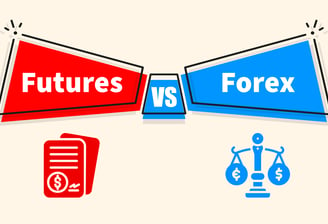Futures vs. Forex: Why Futures Trading is the Better Option
Written by MIKO


At MikoFutures.com, we’re passionate about helping traders make informed decisions to build successful trading careers. Two popular markets often compared by traders are futures and forex (foreign exchange).
While both offer opportunities for profit, futures trading stands out as a superior choice for many traders due to its transparency, regulation, leverage efficiency, and diverse opportunities.
In this article, we’ll break down the key differences between futures and forex trading and explain why futures may be the better option for your trading business.
Understanding Futures and Forex Trading
Futures Trading involves buying or selling standardized contracts to deliver an asset—like commodities, indices, or financial instruments—at a set price and future date. Traded on regulated exchanges like CME Group, futures contracts cover assets such as crude oil, gold, or the S&P 500. Traders profit by speculating on price movements, often using leverage to amplify returns.
Forex Trading involves trading currency pairs (e.g., EUR/USD) in the global foreign exchange market. Forex operates over-the-counter (OTC), meaning trades occur directly between parties without a centralized exchange. Traders aim to profit from fluctuations in exchange rates, also using leverage to enhance gains.
Both markets attract traders due to their liquidity and potential for profit, but their structures, risks, and benefits differ significantly. Let’s explore why futures trading often outshines forex.
Key Advantages of Futures Trading Over Forex
1. Centralized and Transparent Markets
Futures are traded on regulated exchanges like the Chicago Mercantile Exchange (CME), Chicago Board of Trade (CBOT), or New York Mercantile Exchange (NYMEX). These exchanges provide:
- Transparency: Real-time price data, order books, and trading volumes are publicly available, ensuring fair pricing and visibility into market activity.
- Regulation: Oversight by bodies like the Commodity Futures Trading Commission (CFTC) and National Futures Association (NFA) protects traders from manipulation and ensures market integrity.
- Standardized Contracts: Futures contracts have clear specifications (e.g., contract size, expiration dates), reducing ambiguity.
In contrast, forex operates in a decentralized OTC market, where trades are facilitated by brokers or banks. This leads to:
- Less Transparency: Price quotes can vary between brokers, and order book data is often unavailable to retail traders.
- Weaker Regulation: Forex brokers are regulated in some jurisdictions, but oversight is less consistent globally, increasing the risk of broker misconduct or hidden fees.
- Counterparty Risk: Without a central clearinghouse, traders rely on brokers’ financial stability, which can be a concern in volatile markets.
Why Futures Win: The centralized, regulated nature of futures markets ensures a level playing field, making it easier to trust the pricing and execution of trades.
2. Efficient Leverage and Lower Costs
Both futures and forex trading use leverage, but futures offer more efficient and predictable cost structures:
- Futures Leverage: Futures contracts require a margin deposit (typically 5-15% of the contract value), allowing traders to control large positions with relatively small capital. Margin requirements are set by exchanges, ensuring consistency across brokers.
- Clear Fees: Futures trading involves transparent exchange and clearing fees, often lower than forex spreads. For example, trading a Micro E-mini S&P 500 futures contract might cost $1-2 per round turn in commissions, depending on the broker.
- No Hidden Costs: Unlike forex, futures traders don’t face variable spreads or overnight financing fees (swap rates), which can erode profits in forex trading.
Forex trading, while accessible with low initial capital, has drawbacks:
- High Leverage Risks: Forex brokers often offer leverage up to 50:1 or higher, which can lead to significant losses if not managed carefully.
- Spreads and Fees: Forex brokers profit from bid-ask spreads, which widen during volatile periods, increasing trading costs. Swap fees for holding positions overnight can also add up.
- Broker Dependency: Some forex brokers act as market makers, potentially creating conflicts of interest by trading against clients.
Why Futures Win: Futures provide cost-effective leverage with transparent fees, reducing the financial burden of trading and eliminating hidden costs common in forex.
3. Diverse Asset Classes
Futures markets offer a broader range of tradable assets, allowing traders to diversify strategies and capitalize on global opportunities:
- Futures Products: Trade commodities (e.g., oil, gold, wheat), equity indices (e.g., S&P 500, Nasdaq-100), interest rates, cryptocurrencies (e.g., Bitcoin futures), and even weather derivatives. This variety enables traders to hedge or speculate across multiple sectors.
- Global Relevance: Futures contracts are tied to real-world assets, making them sensitive to economic events, geopolitical developments, and market trends.
Forex trading is limited to currency pairs, which restricts opportunities:
- Currency Focus: Forex traders speculate on exchange rate movements, which are influenced by macroeconomic factors like interest rates and trade balances. This can limit diversification.
- Correlation Risks: Many currency pairs (e.g., EUR/USD, GBP/USD) are highly correlated, reducing the ability to spread risk effectively.
Why Futures Win: The diverse product range in futures allows traders to build robust portfolios and adapt to various market conditions, unlike the narrower scope of forex.
4. Robust Risk Management
Futures markets are designed with risk management in mind, offering tools and structures that protect traders:
- Central Clearing: CME Clearing acts as a counterparty to every trade, guaranteeing settlement and reducing default risk. This ensures traders are protected even if a broker fails.
- Standardized Risk Controls: Exchanges set position limits, margin requirements, and daily price limits to prevent excessive volatility and over-leveraging.
- Liquidity: High trading volumes in futures markets (e.g., over 3 billion contracts annually on CME) ensure tight spreads and ease of entering/exiting positions.
Forex markets lack these safeguards:
- No Central Clearing: Trades depend on brokers’ solvency, increasing counterparty risk.
- Variable Liquidity: Liquidity in forex can dry up during major news events, leading to slippage or wider spreads.
- Broker-Driven Risk: Some forex brokers impose stop-outs or margin calls that can disrupt trading strategies.
Why Futures Win: The robust risk management framework of futures markets provides greater security and stability, critical for long-term trading success.
5. Extended Trading Hours
Futures markets operate nearly 24/7, offering flexibility for traders worldwide:
- Futures Hours: Most futures contracts trade 23 hours a day, five days a week, with a brief daily maintenance break. For example, CME Globex facilitates trading from Sunday evening to Friday afternoon (U.S. time).
- Global Access: Traders can react to news and events in real-time, regardless of time zone.
Forex also offers 24/5 trading, but its decentralized nature can lead to:
- Liquidity Gaps: Certain currency pairs may experience lower liquidity during off-peak hours, affecting execution.
- Broker Restrictions: Some forex brokers impose trading limits or higher costs during volatile periods.
Why Futures Win: Futures’ consistent trading hours and high liquidity provide unmatched flexibility and reliability for active traders.
Potential Drawbacks of Futures Trading
While futures trading has clear advantages, it’s not without challenges:
- Higher Capital Requirements: Futures trading often requires more initial capital than forex due to margin requirements (e.g., $500-$5,000 for micro or standard contracts). Forex accounts can start with as little as $100.
- Learning Curve: Futures contracts have specific terms (e.g., tick sizes, expiration dates) that may intimidate beginners.
- Volatility: Futures markets can be highly volatile, requiring disciplined risk management.
However, these drawbacks are mitigated by starting with micro contracts (e.g., Micro E-mini futures), leveraging educational resources on MikoFutures.com, and practicing in simulated environments.
Why Choose Futures with MikoFutures.com?
At MikoFutures.com, we believe futures trading offers a structured, transparent, and versatile path to building a trading business. Our platform supports traders with:
- Educational Resources: Guides on futures markets, contract specifications, and risk management strategies.
- Market Insights: Daily analysis to help you navigate futures markets like CME, CBOT, or NYMEX.
- Community Support: Connect with other traders to share tips and stay motivated.
To get started with futures:
1. Learn the Basics: Study futures contracts and exchanges using MikoFutures.com’s resources.
2. Choose a Broker: Select a CFTC-registered futures broker with competitive fees.
3. Start Small: Trade micro contracts to gain experience with minimal risk.
4. Develop a Plan: Create a trading strategy with clear risk parameters and goals.
Final Thoughts
While forex trading is accessible and popular, futures trading offers distinct advantages that make it the better option for serious traders. Its centralized markets, transparent pricing, diverse products, and robust risk management create a more reliable and rewarding environment. Futures trading aligns with a business-minded approach, providing the tools and structure to achieve consistent profitability.
Ready to explore futures trading? Visit MikoFutures.com for the education, tools, and community to transform your trading into a thriving business. Leave forex’s uncertainties behind and embrace the clarity and opportunity of futures markets today.
© 2025. All rights reserved
Risk Disclaimer ⚠
The information and materials provided by MIKOFUTURES.COM are intended solely as educational resources and do not constitute investment or financial advice. Trading futures contracts is a high-risk activity that may result in both profits and significant losses.
Our platform assumes no responsibility for financial decisions made by users. Any trading, investment, or other financial activities based on information from MIKOFUTURES.COM are undertaken at the user’s sole responsibility.
Important considerations:
• Financial Risk: Trading futures contracts carries the risk of partial or complete loss of capital.
• Non-Guaranteed Results: Past performance does not guarantee future success.
• Suitability: Ensure that trading futures aligns with your financial capacity, experience, and risk tolerance.
We strongly recommend consulting a qualified financial advisor or specialist before engaging in futures trading.
MIKOFUTURES.COM is not liable for losses or any financial consequences resulting from market changes or the use of materials on our platform.
Our goal is to support user education and assist in making informed decisions. However, the ultimate responsibility lies solely with you.


